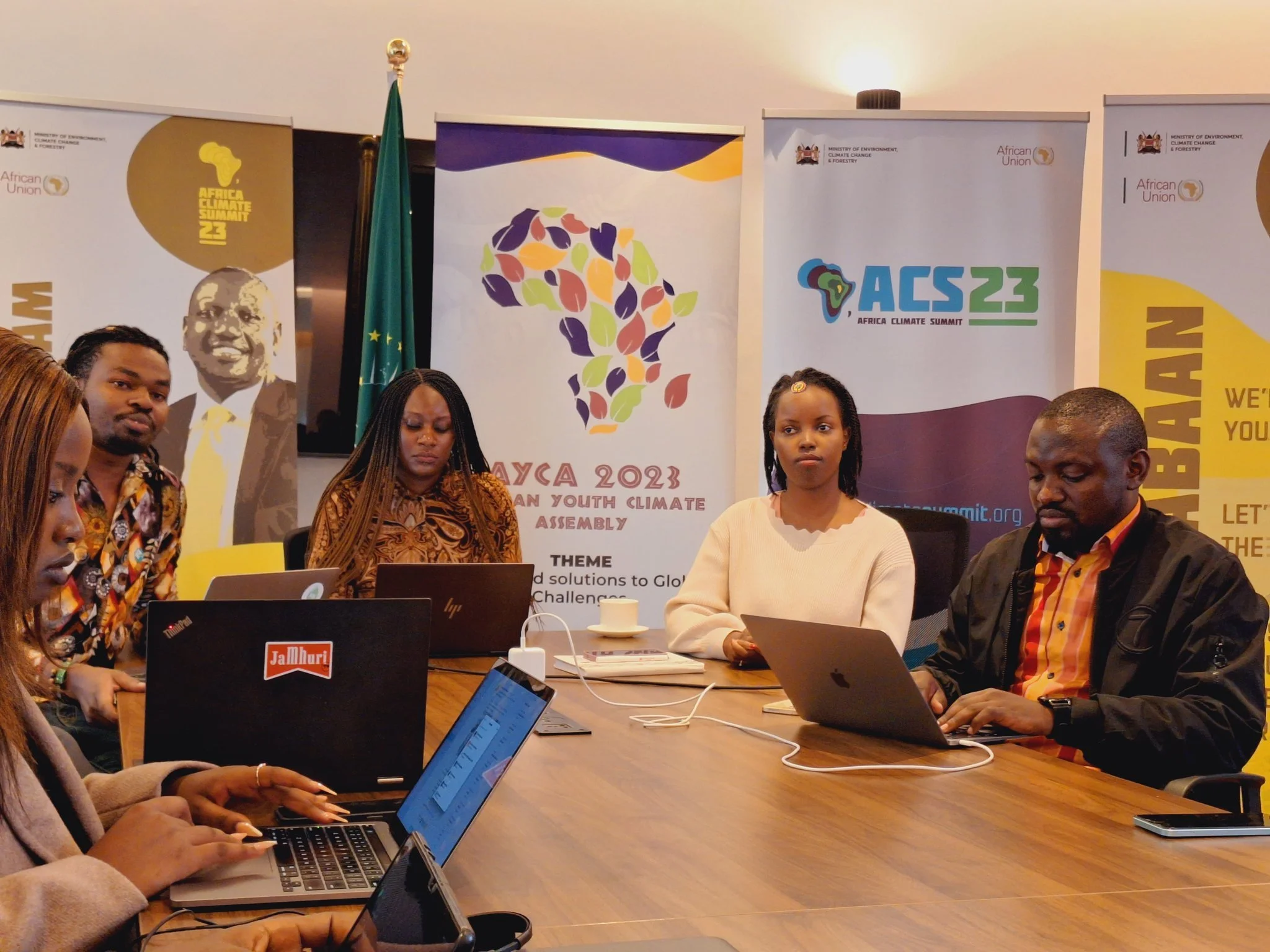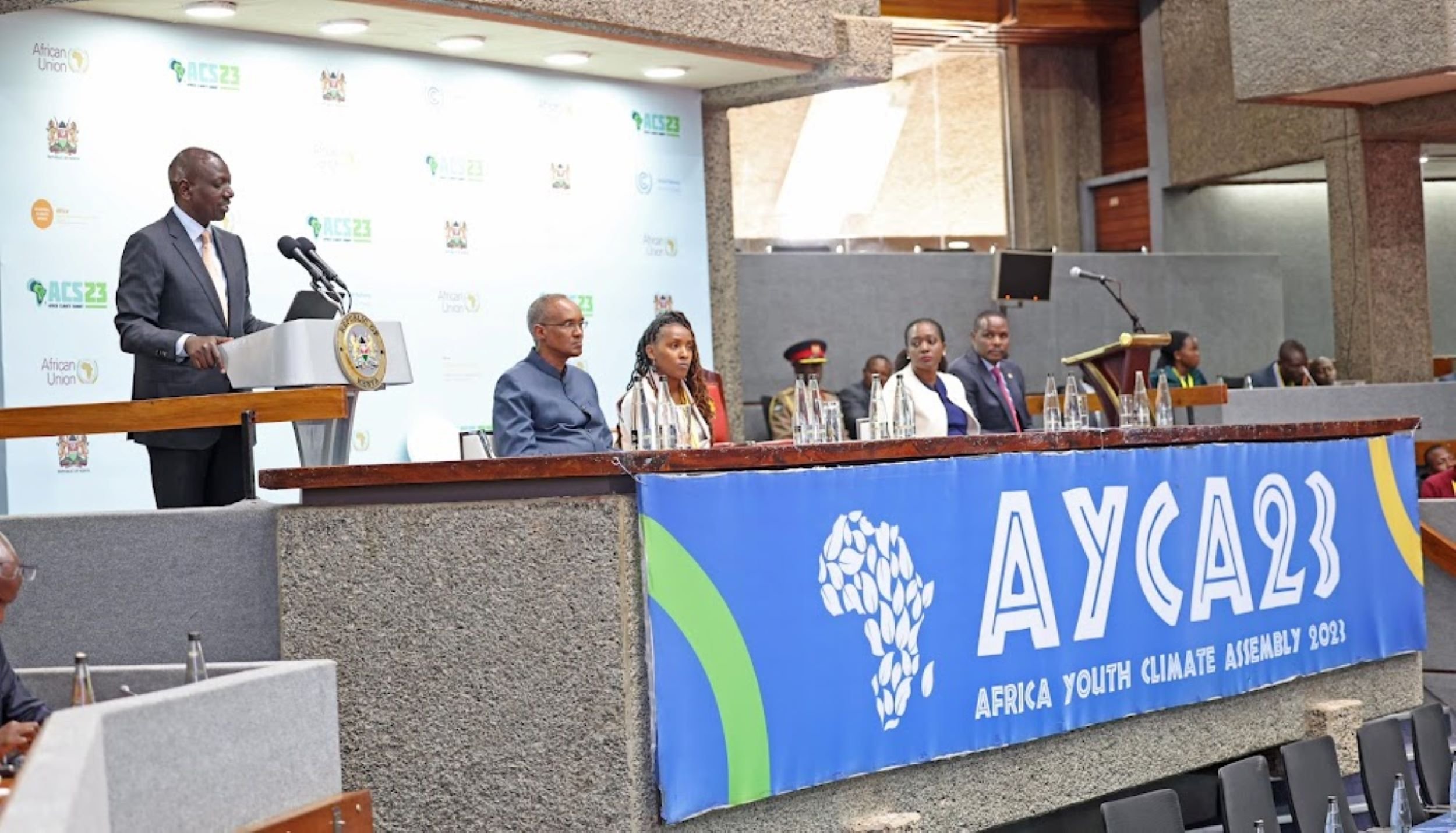The Declaration set out the ambition of the Africa Youth Climate Assembly as a precursor to the inaugural African Union Heads of State and Government Africa Climate Summit (ACS) with the outcomes of the Assembly feeding into the African Heads of State and Government Nairobi Declaration.
PREAMBLE AYCA NAIROBI DECLARATION
Acknowledging the mounting uncertainties surrounding our future due to climate change and the escalating severity of its effects, there is one indisputable fact: We will bequeath this planet to today's children, young individuals, and the generations yet to come;
Noting that Africa has the youngest population in the world, with 70% of sub-Saharan Africa’s population under the age of 30, and that by 2030, young Africans are expected to constitute 42% of global youths, hence African continent can reap from this demographic dividend in the shaping of the green growth agenda.
Recalling the vision highlighted by the Organization of African Unity (OAU) in Agenda 2063 for transforming Africa into the global powerhouse of the future in which youth are its future. We note that Africa is ready to take leadership of a new sustainable future by bringing its collective resources and ensuring its assets shape the green growth agenda toward global decarbonization and help solve the Climate Change problem;
Reaffirming the significant progress made at The Paris Summit for a New Global Financial Pact in developing solutions for countries that have fallen into debt distress and understanding that Africa’s majority of the population are young people and these debts are currently curtailing their empowerment and will continue doing so in the future;
Recalling further the Libreville Declaration on Investing in Innovative Environmental Solutions; where African Ministers of Environment (AMCEN) agreed to take action to create enabling conditions, including enabling national policies to empower youth in Africa, to develop environmental innovations and resilience multi-stakeholder supported facility, to support and scale up local bankable nature solutions and ecosystem approaches, accelerating the incubation of youth-led innovations fostering the creation of green jobs and wealth;
Recognizing the African Union Climate Change and Resilient Development Strategy and Action Plan- the inclusion of young people in the institutional mechanisms of the African Union, as well as dedicated special funds for financing youth climate change action, was emphasized;
Noting, the African Development Bank’s Jobs for Youth in Africa Strategy (2016-2025) and the AfdB Climate Change and Green Growth Strategy (2021-2030), which encapsulates the need to harness Africa’s demographic dividend and facilitate the creation of 25 million jobs and equip 50 million youths with employable skills by 2025, emphasizing on the increased volume and value of climate change and green growth investments with explicit attention to investment components that create and sustain green jobs for local communities.
Referencing the African Youth Charter Article 19; Sustainable Development and Protection of the Environment notes;
States Parties shall recognize the vested interest of young people in protecting the natural environment as the inheritors of the environment;
Train youth in the use of technologies that protect and conserve the environment;
Support youth organizations in instituting programs that encourage environmental preservation such as waste reduction, recycling, and tree planting programs;
Facilitate youth participation in the design, implementation, and evaluation of environmental policies including the conservation of African natural resources at local, national, regional, and international levels;
RESOLUTIONS AND RECOMMENDATIONS
1. They obliged the Key Stakeholders to recognize, promote, and invest in the decision of the African Youth Climate Assembly (“the Assembly”) to establish the Assembly as the principal forum for consolidating and meaningfully enhancing the coordination of youth engagement in climate governance across Member States beyond the ACS and also urge the Key Stakeholders to support youth inclusion in advancing Africa's sustainable development goals and the green growth agenda in official continental forums.
2. They, therefore, call upon the Key Stakeholders, the Youth Division of the African Union Commission (AUC) as well as the Department of Sustainable Environment and Blue Economy to incorporate the Assembly in their program and organizational structures as the platform embedding youth engagement on climate change in the African Union and establish the Assembly as the supporting framework for youth congregations on accelerating multi-sectoral and multi-dimensional stakeholder engagement for youth programs support under Article 19 of the African Youth Charter on Sustainable Development and Protection of the Environment;
3. They urged Key Stakeholders to accelerate the establishment of the AU Heads of State and Governments ambition for a Global Green Bank and New Global Financial Pact, which ensures that African children and youth (as well as their interests) are represented and meaningfully engaged in the operations of the Bank, in its allocation of resources, and the development of financial products to deliver on a global climate actions that are equitable and sustainable.
4. They recommended the setting up of a de-risk and support investments green fund for financial and non-financial services for youth entrepreneurs in Africa as a viable solution to adaptation and green job creation and mechanism to scale up programs that are providing support to youth entrepreneurs to create a pipeline of youth-led enterprises that can benefit from the Youth Entrepreneurship Investments supported from multilateral partnerships including regional multilateral development finance institution;
5. Calling upon the Key Stakeholders, in tandem with the African Heads of States ambition for structuring a global multilateral climate institution, to lobby for the establishment of a United Nations Youth Office (UNGA A/RES/76/306) to be domiciled in Africa, recognizing that AYCA NAIROBI DECLARATION 4 the majority of the young people across the globe are domiciled in Africa;
6. They urged the Key Stakeholders to institutionalize youth participation in all climate-related decision-making at continental forums and institutions for the inclusive, effective, and active empowerment of young individuals to contribute to Africa's climate action agenda.
7. Called upon academic and research institutions, governments, research funding agencies, and the private sector to invest in youth-led research, innovation and data-gathering initiatives to identify local challenges and solutions. Further, calls, upon African governments to support young African scientists to participate in the assessments conducted by the Intergovernmental Panel on Climate Change (IPCC). This includes financial resources, providing expertise and technical support, and exchange and internship opportunities.
8. They urged the Key Stakeholders to strengthen the capacity of young people in climate change mitigation efforts by equipping young people with the knowledge, skills, and funding required to actively participate in the green growth agenda and establishing climate investment mechanisms with a strategic focus on;
Setting up Youths in Mining Innovations and Skilling Program focused on building youth capital to catalyze mining and industrial processing of critical green minerals at 30% youth representation benchmark for all green mining investments;
Propose an E-mobility framework and place youth at the center and as the key implementers of integrating e-mobility and technology innovation across multi-sectoral value chains;
Adopting institutional, administrative, and program measures to mobilize youth as key stakeholders for the 30 x 30 Challenge to protect 30% of Earth’s land and ocean as protected areas by 2030 for Africa’s natural capital in line with the UN Convention on Biodiversity (CBD);
Establish frameworks under the African Carbon Markets Initiative focused on mapping and incentivizing youth efforts under an AU-approved Youth Carbon Markets consortium that allows youth organizations to protect or restore carbon sinks to benefit.
Youth Renewable Energy Initiative- Exploring measures to establish the initiative that leverages Africa's youth demographic populous as ambassadors and agents for increasing public access to renewable energy sources with a special focus on clean cooking, solar-powered, populous and battery energy storage technologies distribution towards addressing Africa’s energy poverty and triple renewable capacity by 2030.
9. Calling upon the Key Stakeholders to strengthen child and youth-specific adaptation and resilience efforts, with urgency, focused on;
Youth Sustainable Agri-business Initiative -Exploring measures to establish the initiative that places youth at the centers of exploring Africa’s agricultural potential with a special focus on climate-smart agro-skilling, agro-forestry, micro-mechanization, Internet of Things (IoT), cottage value addition and raw-processing to attract youth interest matched with investment access
Action for Climate Empowerment through climate education and building resilience by building capacity through learning and disseminating best practices and know-how to adapt and be resilient.
Creation of adaptation jobs, equip young people with entrepreneurial skills for solutions and foster entrepreneurship
10. Build the capacity of youth with disability, their inclusion, expertise, and access to resources in responding to slow-onset climate events in semi to extreme arid areas while supporting local disaster-risk reduction resilience across the continent in particular at schools and rural and informal settlement
11. Develop policy and legal frameworks to protect and empower climate migrants. Ensure climate migrants, especially young ones have access to basic human rights, health, and social security access. We urge stakeholders to recognize planned and regular migration and relocation as an adaptation strategy from now on in policy and practice. Embed human rights and gender-transformative approaches into policies and established them.
Happening 2 weeks after the AYCA on the sidelines of UNGA, the UN Climate Ambition summit (20th September) will convene leaders from governments, businesses, cities and regions, civil society, and finance to come up with new, tangible, and credible commitments to accelerate climate action. The Summit represents a critical political milestone for demonstrating that there is a collective global will to accelerate the pace and scale of a just transition to a more equitable renewable-energy-based, climate-resilient global economy.
AYCA will bring perspectives and outcomes of the biggest Africa's youth climate convening to the UNSG climate summit, especially on the demand to deliver climate justice NOW and support for intergenerational partnership in designing and implementing climate policies. Most importantly, the outcomes of the Assembly will help push accountability and credibility from our world leaders, as well as demand for the government to accelerate commitments ahead of the Climate Ambition Summit and COP28.




